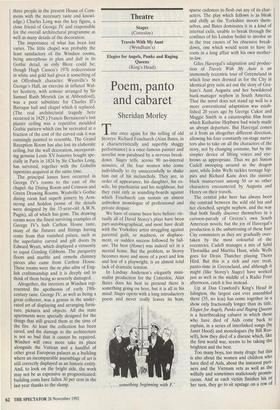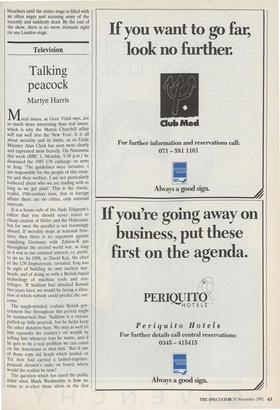Theatre Stages (Cottesloe)
Travels With My Aunt (Wyndham's) Elegies for Angels, Punks and Raging Queens (King's Head)
Poem, panto and cabaret
Sheridan Morley
Time once again for the telling of old Storeys: Richard Fenchurch (Alan Bates, in a characteristically and superbly shaggy performance) is a once-famous painter and novelist now paralysed by a nervous break- down. Stages tells, across 90 no-interval minutes, of the four women who come individually to try unsuccessfully to shake him out of his melancholy. They are, in order of appearance, his daughter, his ex- wife, his psychiatrist and his neighbour, but they exist only as sounding-boards against which Fenchurch can sustain an almost unbroken monologue of professional and private despair. , We have of course been here before: vir- tually all of David Storey's plays have been part-autobiographical, and most have dealt with the Yorkshire artist struggling against parental guilt, or madness, or displace- ment, or sudden success followed by fail- ure. The best (Home) was indeed set in a mental home. But the problem, as Storey becomes more and more of a poet and less and less of a playwright, is an almost total lack of dramatic tension.
In Lindsay Anderson's elegantly mini- malist production for the Cottesloe, Alan Bates does his best to pretend there is something going on here, but it is all in his mind: Stages opens with a long introductory poem and never really leaves its lean, ' . . . something beginning with F.' sparse cadences to flesh out any of its char- acters. The play which follows is as bleak and chilly as the Yorkshire moors them- selves, and Bates dominates it in a kind of internal exile, unable to break through the confines of his London bedsit to involve us in the true causes of his obsessive break- down, one which would seem to have its roots in a long affair with his own mother- in-law.
Giles Havergal's adaptation and produc- tion of Travels With My Aunt is an immensely eccentric tour of Greeneland in which four men dressed as for the City in identical grey suits act out the story of Gra- ham's Aunt Augusta and her bewildered bank-manager nephew in South America. That the novel does not stand up well to a more conventional adaptation was estab- lished 20 years ago by George Cukor and Maggie Smith in a catastrophic film from which Katharine Hepburn had wisely made an abrupt departure. But Havergal comes at it from an altogether different direction, allowing his four constantly on-stage narra- tors also to take on all the characters of the story, not by changing costume, but by the simpler device of lifting voices and eye- brows as appropriate. Thus we get Simon Cadell swooping around as the dragon aunt, while John Wells tackles teenage hip- pies and Richard Kane does the sinister black manservant among 50 or so other characters encountered by Augusta and Henry on their travels.
The central joke here has always been the contrast between the wild old bat and her clenched, upright nephew, and the way that both finally discover themselves in a cartoon-parody of Greene's own South American novels; but the joy of Havergal's production is the unbuttoning of these four City commuters as they are gradually over- taken by the most colourful of the eccentrics. Cadell manages a mix of Sybil Thorndike and Martita Hunt, while Wells goes for Denis Thatcher playing Thora Hird. But this is a rich and rare treat, panto-time in Greeneland, and although it might (like Storey's Stages) have worked just as well in the middle of a Radio Four afternoon, catch it live instead.
Up at Dan Crawford's King's Head in Islington, the largest cast ever assembled there (35, no less) has come together in a show only fractionally longer than its title. Elegies for Angels, Punks and Raging Queens is a heartbreaking cabaret in which those who have died of Aids come back to explain, in a series of interlinked songs (by Janet Hood) and monologues (by Bill Rus- sell), how they died of a disease which, like the first world war, seems to be taking the brightest and the best.
Too many boys, too many drugs: but this is also about the women and children who have died of Aids, about the innocent part- ners and the Vietnam vets as well as the wilfully and sometimes maliciously promis- cuous. And as each victim finishes his or her turn, they go to sit upstage on a row of bleachers until the entire stage is filled with an often angry and accusing army of the recently and suddenly dead. By the end of the show, there is no more dramatic sight on any London stage.











































































 Previous page
Previous page